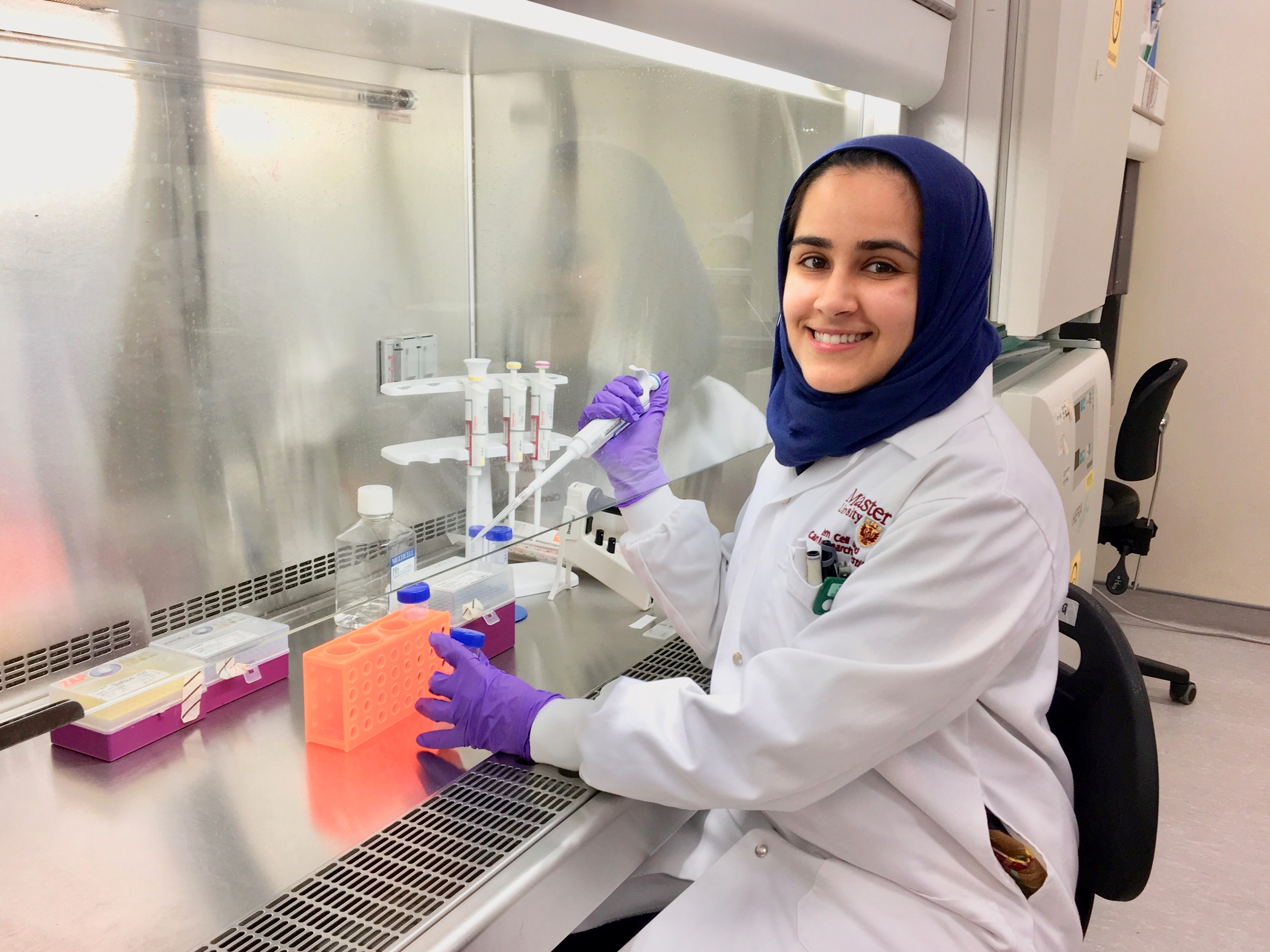Co-targeting two specific proteins in cancer stem cells could significantly reduce tumour growth in patients with recurrent glioblastoma (rGBM), a McMaster University-based TFRI team has learned.
According to Maleeha Qazi, a PhD candidate and lead author of a recent paper published in Cancer Research (July 2018), the team arrived at this conclusion after realizing that high levels of both EphA2 and EphA3, two members of the Ephrin receptor family involved in important signalling in brain development, marked the tumorigenic, therapy-resistant glioblastoma stem cell (GSC) population.
“We used cell lines derived from GBM patients that had already received chemotherapy and radiation therapy and profiled the expression of all 14 Ephrin receptors. We found that together, these two proteins – EphA2 and EphA3 – marked a very potent GSC population within treatment-refractory rGBM,” said Qazi, who is part of Dr. Sheila Singh’s Terry Fox New Frontiers Program Project Grant (PPG). With a partner group at the U of T led by Dr. Jason Moffat, PPG co-investigator and an expert in gene editing technology, Dr. Singh’s team mined large glioma datasets and conducted validation studies that underscored their finding that both EphA2 and EphA3 were potent targets. “Learning that was great because it provided us with two GSC-specific targets against which we could then develop new therapeutics for patients with rGBM.”
To develop these new therapies, Qazi work with Dr. Sachdev Sidhu (UofT), a protein engineer and co-investigator in Dr. Singh’s PPG team. Together the researchers were able to create a bi-specific antibody (BsAb) that simultaneously targeted these two markers and began testing it in mice.
It was during these preclinical trials that Qazi and her team saw the most promising results, including a decrease in the frequency of GSCs and a 30 per cent reduction in tumour volume when the antibody was delivered intracranially.
“Recurrent GBM is the deadliest human brain cancer and has no effective therapies, so for us to block even 30 per cent of tumour growth is quite significant, especially because these tumours have already evaded standard-of-care chemotherapy and radiation,” said Qazi, adding that these results could be even more positive in humans, since BsAbs could be delivered more effectively in humans than in mice.
The team is now excited to transition the antibodies into clinical trials, bringing much-needed hope to patients with rGBM.
“The best thing about these antibodies is that they are already humanized and are perfectly poised for further development for human clinical trials. Patients suffering from recurrent GBM really do not have any other options, so for us to offer a poly-targeting therapy that shows preclinical efficacy in proof-of- concept models makes it much easier to present it as a treatment option for patients with recurrent GBM,” Qazi said. “That's the kind of thing that we hope to do moving forward with this antibody and other targeted therapies under development within the framework of our TFRI PPG grant.”

Maleeha Qazi is a PhD candidate at McMaster University and the lead author of the paper published in Cancer Research (July 2018).
Study
Co-targeting ephrin receptor tyrosine kinases A2 and A3 in cancer stem cells reduces growth of recurrent glioblastoma
Authors
Maleeha A. Qazi, Parvez Vora, Chitra Venugopal, Jarrett Adams, Mohini Singh, Amy Hu, Maryna Gorelik, Minomi K. Subapanditha, Neil Savage, Jiahe Yang, Chirayu Chokshi, Max London, Alexander Gont, David Bobrowski, Natalie Grinshtein, Kevin R. Brown, Naresh K. Murty, Johan Nilvebrant, David Kaplan, Jason Moffat, Sachdev Sidhu, Sheila K. Singh
Funding
This study was funded by a Terry Fox New Frontiers Program Project Grant in Targeting clonal heterogeneity in treatment-refractory glioblastoma with novel and empiric immunotherapies